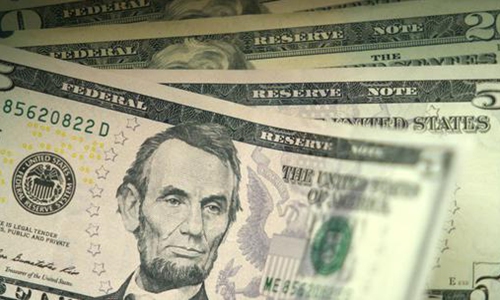
Photo taken on March 3, 2020 shows U.S. dollar banknotes in Washington D.C., the United States.Photo:Xinhua
China slashed $6.3 billion worth of US debt in September for the fourth consecutive month in a year, a move that indicates China is systematically reducing its holdings of US bonds as the dollar default risks rise and the outlook of the China-US ties remain uncertain under the incoming Biden administration, experts said.
China decreased its holdings of US treasury bonds by $6.3 billion to $1.06 trillion in September, remaining the world's second-largest holder of US debt after Japan, data from US Treasury Department showed on Tuesday.
The cut in September marks the fourth consecutive month for China to trim its holdings of US bonds in the year, after reducing $5.4 billion in August, $1 billion in July and $9.3 billion in June.
The potential risks behind surging debt level in the US could be one reason why China has gradually cut its holdings of US treasury bonds, experts said.
It is necessary for China to diversify risks and appropriately reduce the holdings of US dollar assets to avoid a possible dollar collapse, Dong Dengxin, director of the Finance and Securities Institute at the Wuhan University of Science and Technology, told the Global Times on Wednesday.
"Loose monetary policy in the US has led to the largest fiscal deficit in its history. The imbalance of fiscal revenue and expenditure may lead to a crash of the dollar," Dong said.
Data from the US Treasury Department shows that the US fiscal deficit has reached a record high.
Affected by previous large-scale fiscal stimulus measures, the US budget deficit has more than tripled in the fiscal year ending September to over 3.1 trillion dollars which amounts to 16 percent of the US GDP ending in September, the largest since 1945, a Treasury Department report showed in October.
The federal debt, which reflected the accumulated deficits and the occasional surplus, is forecasted to reach 100 percent of GDP next year.
Doubts over whether the incoming Biden administration could fix the deterioration in China-US relations caused by the Trump administration is another reason for China to sell the US bonds, experts said.
"In this context, it is necessary for China to increase the holdings of non-US dollar assets and increase the reserve of major strategic materials such as gold and crude oil," Dong said.
As of the end of October, China's foreign exchange reserves were $3.12 trillion, down 0.46 percent, or $14.6 billion, from the previous month, the second consecutive month of decline, according to data released by the State Administration of Foreign Exchange and the People's Bank of China on November 7.
On the other hand, China's gold reserves reached 1,948 tons by the end of October, the same as the previous month.
"China is expected to trim the foreign exchange reserves to $2 trillion in the future and dollar will be the main object. The reduction will be a persistent and steady process," he said.

